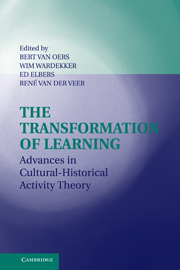Book contents
- Frontmatter
- Contents
- List of Contributors
- Preface
- INTRODUCTION
- SECTION ONE TENETS OF ACTIVITY THEORY
- Introduction to Section One: Exploring Vygotsky's Legacy: The Meaning of Mediation
- 2 Multiple Readings of Vygotsky
- 3 Exploring the Links between External and Internal Activity from a Cultural-Historical Perspective
- 4 Reflections on Points of Departure in the Development of Sociocultural and Activity Theory
- 5 Language in Cultural-Historical Perspective
- 6 The Formation Experiment in the Age of Hypermedia and Distance Learning
- 7 Constructivism and Meaning Construction
- 8 Subject, Subjectivity, and Development in Cultural-Historical Psychology
- SECTION TWO IDENTITY, DIVERSITY, AND INCLUSION
- SECTION THREE DYNAMICS OF ACTIVITY AND THE VARIATIONS OF LEARNING
- Index
- References
5 - Language in Cultural-Historical Perspective
Published online by Cambridge University Press: 25 August 2009
- Frontmatter
- Contents
- List of Contributors
- Preface
- INTRODUCTION
- SECTION ONE TENETS OF ACTIVITY THEORY
- Introduction to Section One: Exploring Vygotsky's Legacy: The Meaning of Mediation
- 2 Multiple Readings of Vygotsky
- 3 Exploring the Links between External and Internal Activity from a Cultural-Historical Perspective
- 4 Reflections on Points of Departure in the Development of Sociocultural and Activity Theory
- 5 Language in Cultural-Historical Perspective
- 6 The Formation Experiment in the Age of Hypermedia and Distance Learning
- 7 Constructivism and Meaning Construction
- 8 Subject, Subjectivity, and Development in Cultural-Historical Psychology
- SECTION TWO IDENTITY, DIVERSITY, AND INCLUSION
- SECTION THREE DYNAMICS OF ACTIVITY AND THE VARIATIONS OF LEARNING
- Index
- References
Summary
From the point of view of the tasks of a science of language, the cultural-historical approach to the human mind is not a metatheory or philosophy standing above the sciences in the sense of a set of general ideas to be applied to or confirmed in specifically linguistic material. It is, rather, a particular science whose findings and implications, by the nature of its subject matter, cannot but interconnect in intimate fashion with those of a linguistic science. From this perspective, the task before a science of language is, therefore, to “prove this systematic connection” with the achievements of the cultural-historical tradition “both in general and in particular” (Engels, 1975). Indeed, this is the way Vygotsky and his colleagues approached their own scientific work. For them, the cultural-historical approach to the mind was itself developed as an attempt to “prove the systematic connection” between human psychological processes and the processes of sociohistorical emergence and evolution identified and studied by Marx and Engels and expressed theoretically in their “materialist conception of history.” It is this concrete knowledge of the dynamic of human social life as well as of the nature and development of thinking with which students of language must reckon and in relation to which they must make their own distinctive contribution.
The materialist conception of history, and the cultural-historical theory with it, understands that humanity – all human faculties, practices, knowledge, and relations – is a work in progress.
- Type
- Chapter
- Information
- The Transformation of LearningAdvances in Cultural-Historical Activity Theory, pp. 76 - 99Publisher: Cambridge University PressPrint publication year: 2008
References
- 6
- Cited by



